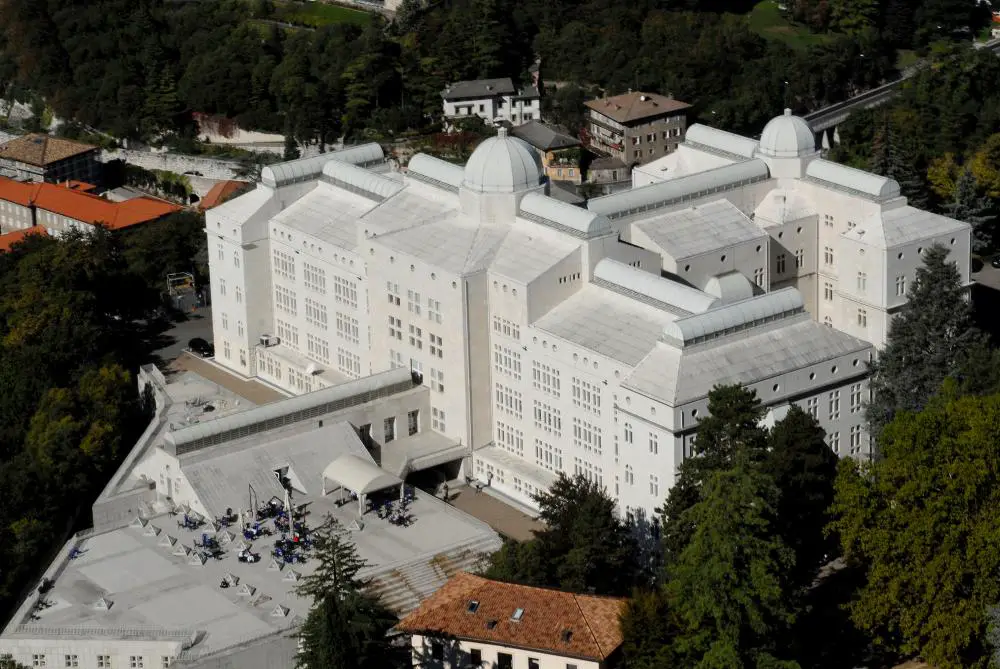When it comes to studying computer science in Italy, you’ll have a lot of options in terms of location and the particular specialization you choose to study. These universities offer some of the best undergraduate, graduate, and Ph.D. programs in the country. If you’re interested in learning computer science in Italy, check out one of these universities next year!
1. Sapienza University of Rome

Sapienza, as it’s commonly called, is one of only three public universities in Rome, and—along with Bocconi and Politecnico—one of its leading technical schools. It offers various computer science courses at both undergraduate and graduate levels.
Undergraduates can choose between subjects such as information technology and computing, software engineering, and artificial intelligence, while post-grads specialize in fields including programming theory and applications development. The university also runs special summer school programs for students from foreign countries to study Italian at Sapienza alongside their academic coursework.
2. Bologna University

Bologna University was founded in 1088, making it one of Italy’s oldest institutions. Its Department of Computer Science is well-regarded for its Master’s and Ph.D. programs, which offer a range of specialization options—from human-computer interaction to information systems and cybernetics.
Courses cover topics such as how we interact with technology, how to make technological problems easier to solve through software design, and how humans can collaborate better using new technologies. If you want a real academic challenge (and who doesn’t?), consider earning your Master’s at Bologna University.
3. University of Trento

The University of Trento was established in 1962, it mainly focuses on strengthening and developing its international alliances. At present, the university includes over 16,000 students and 600 professors. They strategically have partnered with the most distinguished research centres & universities all across the world and established their bilateral agreements. Besides, the University of Trento today is considered the top computer science institute in Italy.
Computer science courses offered: BSc with a range of specializations, including Artificial Intelligence and Robotics, Computer Systems, Networks and Telecommunications. PhDs are also offered in Artificial Intelligence, Robotics and Computer Systems.
4. Polytechnic University of Milan

The Faculty of Engineering of Milan is part of a network consisting of seven other prestigious Italian institutions with a similar mission. It offers courses in Computer Science, Electrical Engineering, Mechatronics, and Industrial Design.
The university’s Research Center has been recognized as one of Europe’s most innovative thanks to its research activities carried out in biomedical engineering and energy efficiency. The university offers academic programs taught entirely or partially in English to facilitate student mobility and encourage international collaboration among students and professors.
5. IULM University

IULM Bocconi, also known as Istituto Universitario di Lingue e Comunicazioni Interculturali Luigi Bocconi (IULM), is a university focused on courses such as Economics and Business Management. There are several courses offered by IULM which focus on Computer Science and Information Systems, including ones related to Networks Engineering and Security, Intelligent Interactive Systems, Software Engineering, and Web Engineering.
The Master of Science in Computer Science is delivered by both University College London (UCL) and UCL’s partner institution The Higher Technical Institute of Venice (HTIV). Courses last 1 year full-time or 2 years part-time and are taught mainly at HTIV with occasional visits to London.
6. University of Padua

The University of Padua offers a wide range of courses and degrees, including those in medicine, pharmacology, and economics. However, it is Padova’s computer science degree that made it possible to gain a firm footing on university rankings worldwide. For example, The Times Higher Education ranked it as one of Europe’s top 100 universities in 2017 thanks to its broad array of advanced programs across four academic faculties: Science and Engineering; Medicine and Surgery; Humanities, Arts and Social Sciences; Agricultural, Environmental, and Life Sciences. Students have to show strong English skills prior to matriculation however because all courses are taught in English.
7. University of Salerno

The University of Salerno offers both undergraduate and graduate courses in information science, telecommunications engineering, and industrial informatics. You can study in Italian or English with a curriculum based on a broad range of topics such as database systems, artificial intelligence, computational linguistics, and programming languages.
In 2017, QS World University Rankings by Subject ranked L’Orientale de Salerno’s Department of Information Science 29th worldwide. The department’s MSc in Computer Science was also listed as 25th worldwide that year.
8. University of Pisa

The University of Pisa was founded in 1968 and joined Scuola Superiore Sant’Anna (SSSA) as one of its departments. The school has a multidisciplinary curriculum, offering programs covering science, technology, and economics with specialties including physics, information engineering, biomedical engineering, and digital art.
Computer science is available as a minor alongside more standard majors such as physics or economics; students can also take courses in programming if they’re planning on studying abroad in China. In 2013 SSSA Pisa came into partnership with Cisco Systems to offer one of their signature programs: CCIE Security Essentials. Students spend a year learning hands-on about all things security, including intrusion detection systems, firewalls, and intrusion prevention systems.
9. University of Ferrara

The University of Ferrara offers five different degrees related to computer science, including a Ph.D. Students can choose to study at a variety of levels and pursue their degree from one of three schools: Letters, Humanities, and Languages; Sciences, Mathematics, and Engineering; or Law, Political and Social Sciences.
In addition to courses offered through traditional programs, students also have access to accelerated courses that allow them to complete their degrees faster. This approach is particularly useful if students are interested in acquiring a career with a shorter time frame, such as an information technology consultant or software developer.
10. LUISS Guido Carli

Computer science degrees have been offered at LUISS Guido Carli – Università Commerciale Luigi Bocconi since 1976, and they’re some of Italy’s most highly regarded computer science programs. The master’s degree program is taught primarily in English, which makes it ideal for students who don’t speak Italian but want to learn more about Italian culture while earning their degree.
Students can take courses covering a broad range of topics within computer science, including programming languages; networks and distributed systems; databases and information retrieval systems; advanced software development; human-computer interaction and multimedia systems; parallel processing systems; artificial intelligence algorithms; and digital signal processing.
Final Words
These are the best universities that offer computer science degrees in Italy, based on their research and reputation in the field. Besides, you can select from its Computer Science degree programs: undergraduate & Master. You will just need a strong Italian language to go ahead with the undergraduate degree, but master’s programs are taught in English.
The post 10 Best Computer Science Universities in Italy 2022 appeared first on The Crazy Programmer.
from The Crazy Programmer https://ift.tt/4vCMhTB
Comments
Post a Comment